ASTANA – Last week, the Kazakh capital hosted a conference dedicated to the Alma-Ata and Astana declarations on primary healthcare. It also convened representatives of 53 countries for the 73rd session of the World Health Organization’s Regional Committee for Europe. In an interview with The Astana Times, WHO Regional Director for Europe, Dr Hans Kluge, discussed the outcomes of the session, the role of Kazakhstan in fostering primary healthcare worldwide and what lessons the world needs to learn from the COVID-19 pandemic.
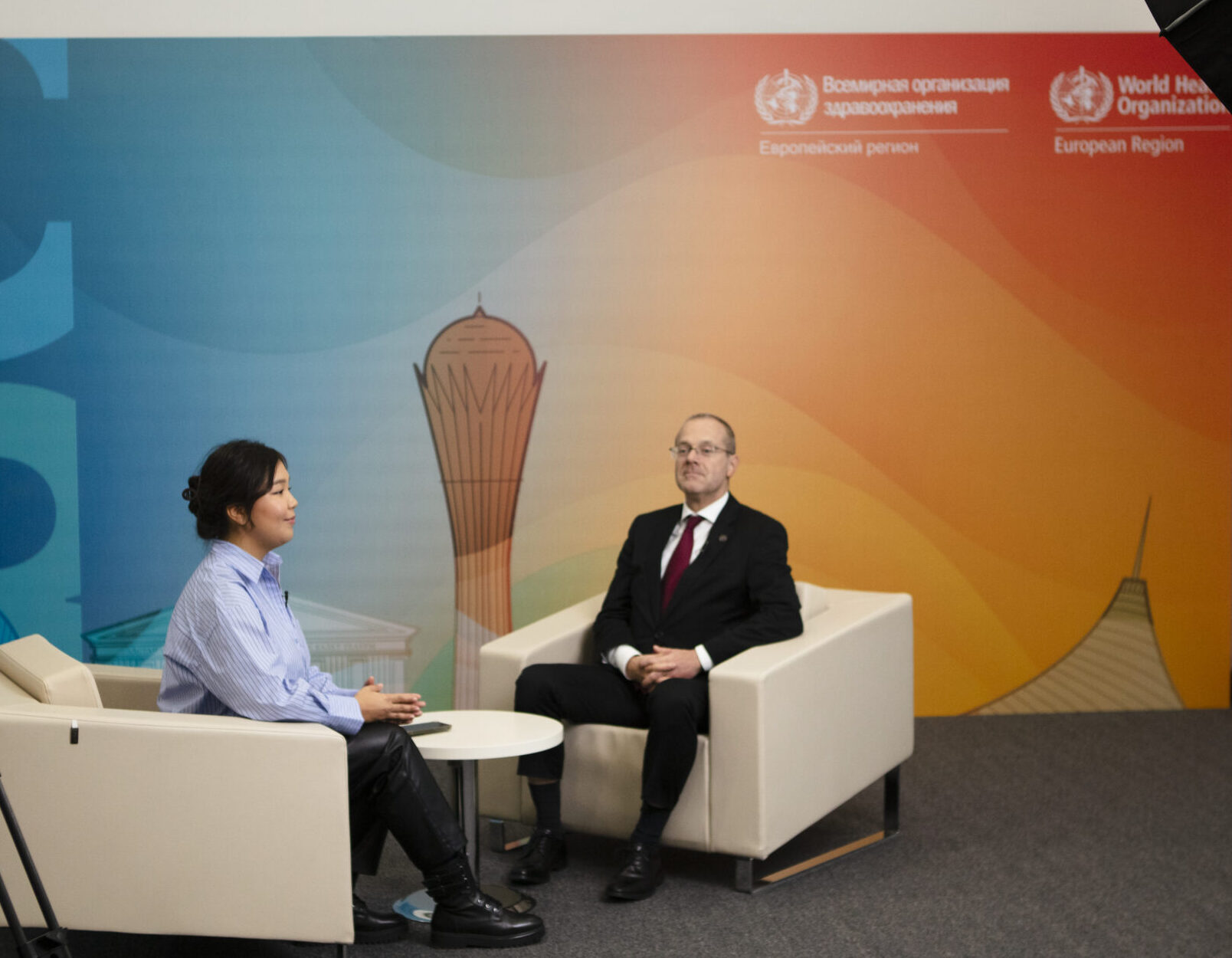
The Astana Times journalist Assel Satubaldina interviews Dr Hans Kluge. Photo credit: Uka Borregaard/WHO Europe
At the international conference in Astana on Oct. 22, 70 countries convened to step up primary healthcare investments by 2030. Co-hosted by the Kazakh government and UNICEF, the conference brought together over 600 health policymakers and partners.
“Kazakhstan, first and foremost, is the birthplace of primary healthcare,” said Kluge.
He recalled the Alma-Ata Declaration that was signed in 1978, which laid the foundation for a more equitable and comprehensive approach to healthcare. It was the first international declaration underlining the importance of primary healthcare as a means to achieve health for all.
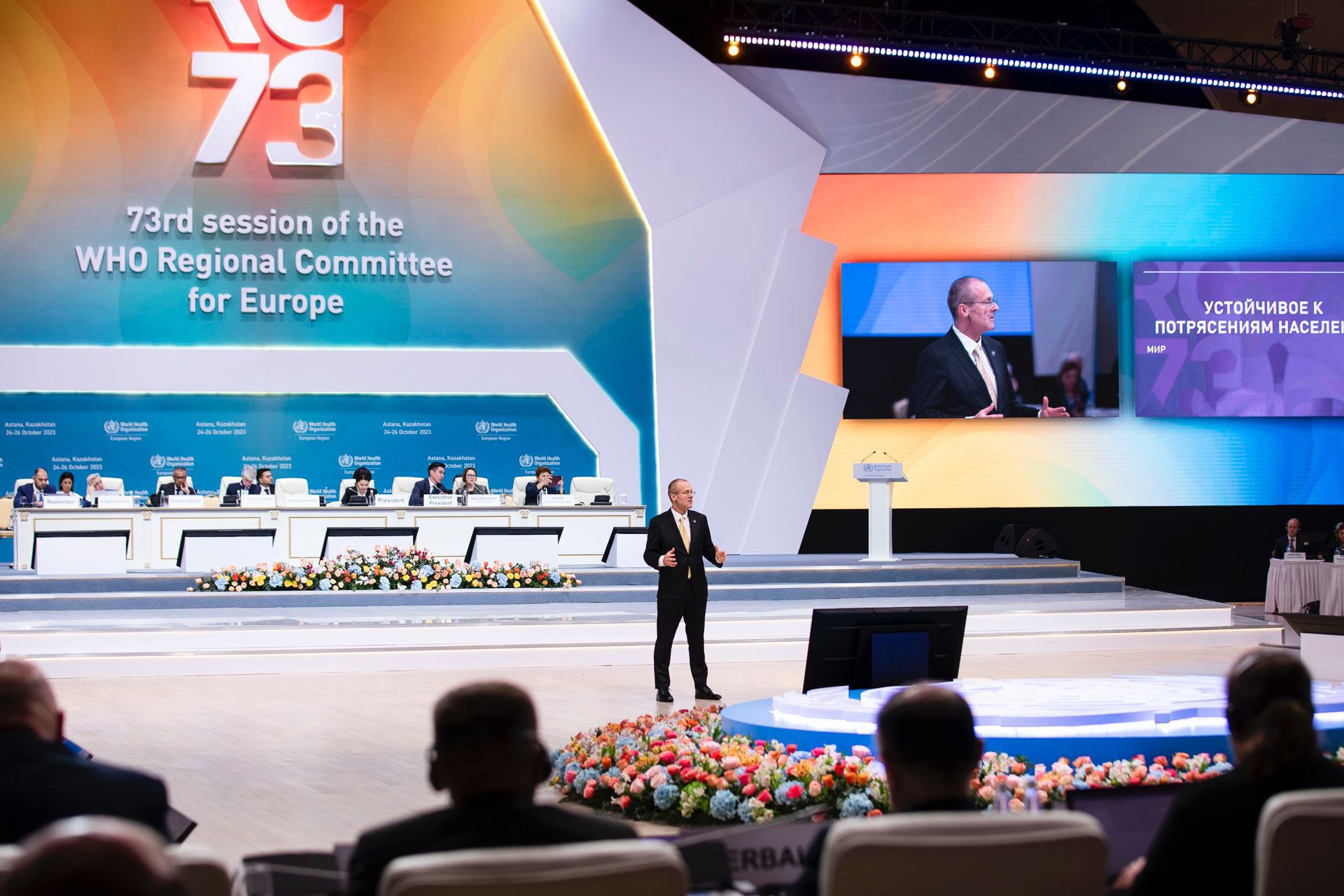
Hans Kluge addresses the 73rd session of the WHO Regional Committee for Europe. Photo credit: WHO Europe
“It is still very relevant today because we have our health systems under a lot of pressure. Primary healthcare is to be the anchor, the backbone of any health system to bring healthcare close to the communities where the people are living and where they are working,” said Kluge.
He emphasized that primary healthcare can solve 80% of health problems. According to the WHO estimates, scaling primary healthcare interventions across low and middle-income countries could save 60 million lives and increase average life expectancy by 3.7 years by 2030.
Power of youth
Kluge said the “beauty” was that the outcome statement was developed by youth.
“Because five years ago, at the birth of the Astana declaration, we agreed to see the youth as an equal partner in the health and well-being decision-making process. So, if we look back, we kept the commitment,” he said.
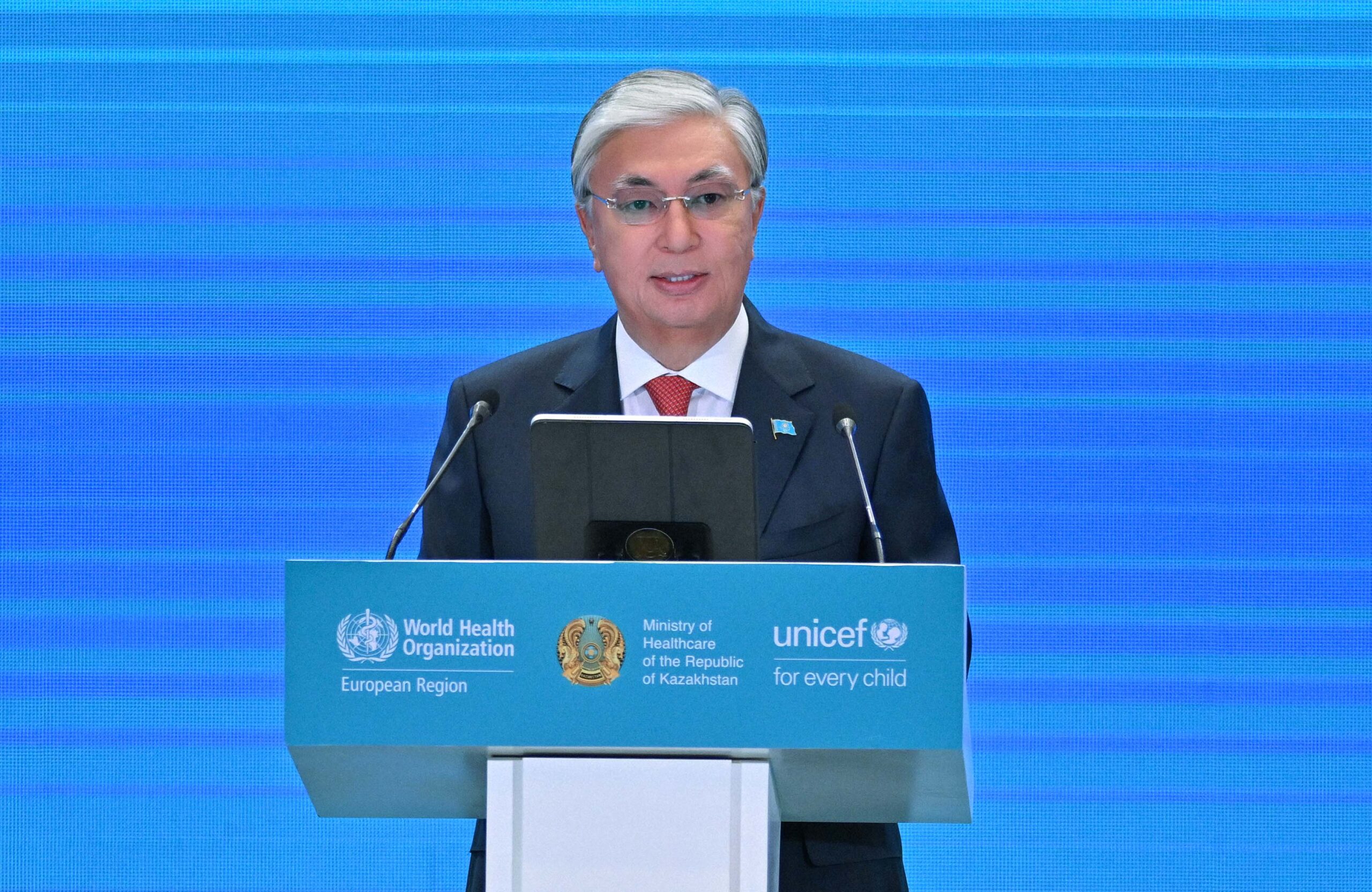
President Tokayev delivers remarks at the international conference on primary healthcare on Oct. 22. Photo credit: akorda.kz
Empowering youth to drive the healthcare agenda has been one of the key messages of President Kassym-Jomart Tokayev’s address to the conference. He said he had “high hopes” for young people in the development of primary healthcare and the healthcare system overall.
“We were amazed by the commitment that President Kassym-Jomart Tokayev came himself, telling that primary healthcare and health in general is really the fundament of a thriving society of the economy and that the youth, particularly in Central Asia, where one out of two persons almost youth, is really to be taken very seriously,” said Kluge.
New biennial agreement
On the sidelines of the forums, the Kazakh government and the WHO signed a new collaborative agreement for the next two years. The agreement aims to strengthen collaboration to prevent noncommunicable diseases, improve health emergency preparedness and response, infection prevention and control, digital health, immunization, and antimicrobial resistance, among other areas.
The WHO will allocate $1.8 million for Kazakhstan’s healthcare development under the agreement. “A collaborative agreement goes both ways. I call it a win-win situation,” said Kluge.
The first objective is to document the innovations happening in the country.
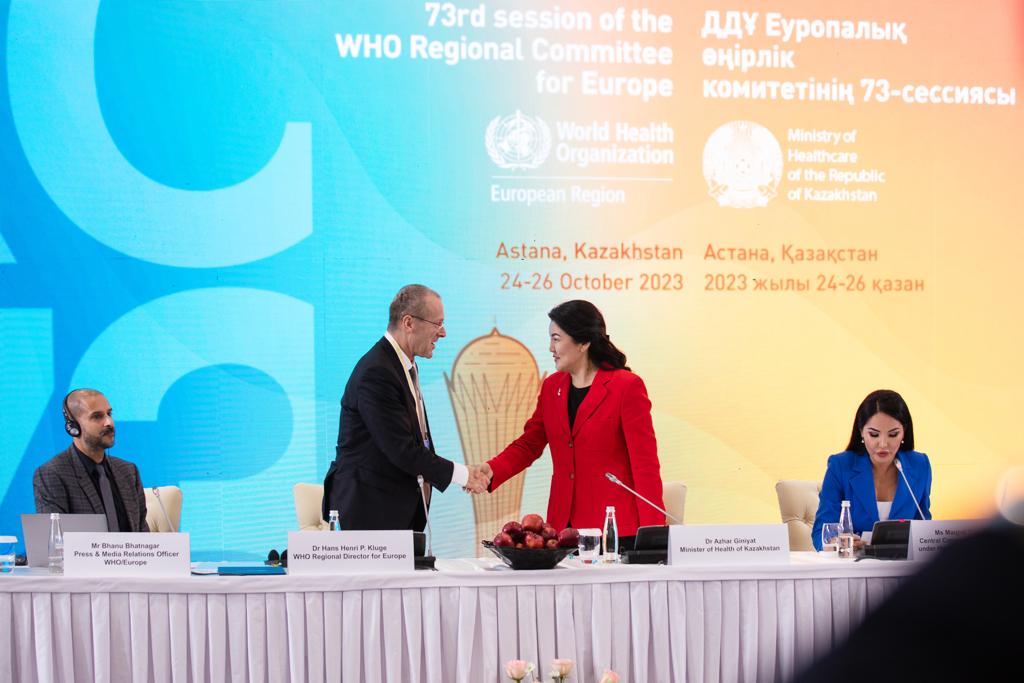
Hans Kluge and Kazakh Health Minister Azhar Giniyat shake hands after signing the agreement. Photo credit: WHO Europe
“What Kazakhstan did really amazingly is to have one psychologist in the primary healthcare team for every 5,000 people because mental health all over the world is a big issue, especially after the lockdowns,” noted Kluge.
He stressed that Kazakhstan is an important partner for the WHO. In addition to the country office, the organization has a special office on primary healthcare in Almaty, which is a “center of excellence” of WHO for all 53 countries.
In 2022, the WHO launched a primary healthcare demonstration platform in Esik town in the Almaty Region with a holistic, multidisciplinary team-based model and strong elements of mental healthcare and social work.
“Last year, I was myself in the Enbekshi multidisciplinary interdistrict hospital, where we launched the first WHO demonstration platform on primary healthcare. Other countries are coming now to learn what it means to have a multidisciplinary team because we cannot have primary healthcare facilities with only one doctor and one facility. We need to have teams with psychologists, dietitians, social workers,” said Kluge.
Key outcomes of the 73rd session
Discussing the key outcomes stemming from the 73rd session of the WHO Regional Committee for Europe, Kluge said he was “quite inspired.”
Health ministers and delegates from 53 member states agreed on the new European roadmap on antimicrobial resistance, designed to support countries in the WHO European Region to identify, prioritize, and implement high-impact interventions to tackle antimicrobial resistance.
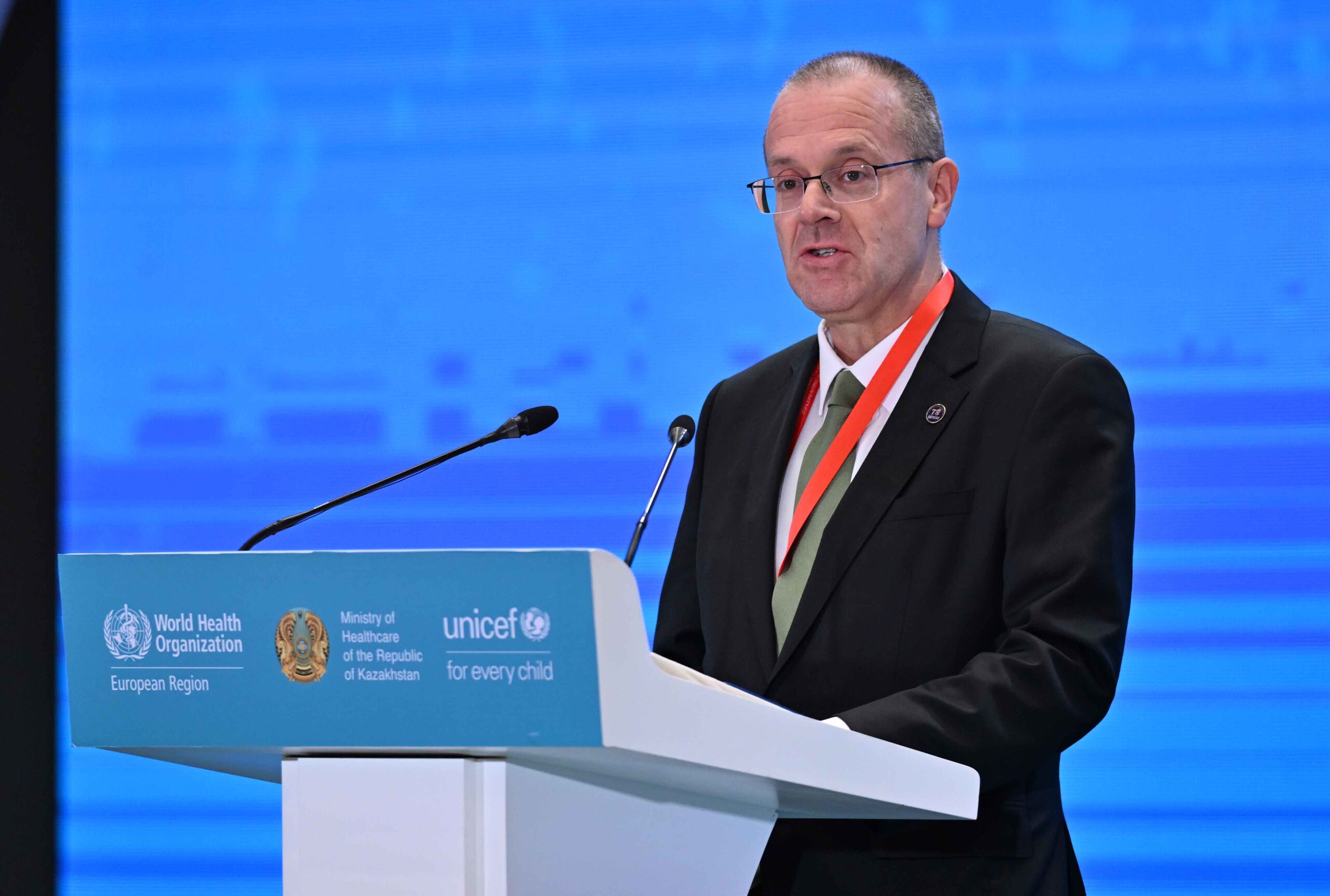
Dr Kluge addresses the international conference on Oct. 23. Photo credit: akorda.kz
The roadmap envisions 53 interventions, from traditional measures, such as improving hygiene and vaccination, to using whole genome sampling to improve environmental surveillance.
The session also adopted what Kluge described as a “historical resolution” on the future of the healthcare workforce across Europe and Central Asia. It comes at a crucial time when countries are struggling to retain and attract an adequate workforce in the healthcare sectors with the appropriate skill sets to address the increasing and evolving requirements of patients.
“There is no health without a health workforce. I would like to take advantage to thank all doctors and nurses of Kazakhstan for an amazing job during COVID-19. But now still, we have to further encourage them, encourage our young people to become doctors and nurses,” emphasized Kluge.
Is the world prepared for the pandemic?
While it has been four years since COVID-19 hit humanity, killing nearly seven million people, the consequences will persist for a long time. Kluge said the “big lesson is that no one is safe until everyone is safe.”
Vaccine inequality has been a major challenge, with limited vaccine production capacity and wealthier nations securing a majority of early vaccine doses.
“We saw everyone speak about solidarity, but not all countries did it. For example, a number of countries had the first vaccines but kept them for themselves instead of sharing. I have to thank Mr. President and Dr. Azhar Ginyat [Kazakh health minister]. From the beginning, Kazakhstan has helped a lot of countries, not only with vaccines. There was a shortage of masks and gloves,” he said.
Challenging task to convince countries
Kluge began his term as WHO Regional Director for Europe in February 2020. Graduating from the Catholic University of Leuven in 1994 with a degree in medicine, surgery and obstetrics, Kluge has 25 years of experience in medical practice and public health in numerous locations around the world.
When asked on a personal level how challenging it was to be leading the organization’s European bureau, Kluge said the challenge is to convince countries.
“The WHO stands for equity, health for all, but we have to convince countries. If a country does not want to accept a mission to check the data or a country does not want to share data, this is a big challenge. We have to work based on a partnership between all countries. A second challenge is that when I became regional director three years ago, there was no global crisis. Now, we have too many wars: Ukraine – Russia, Armenian – Azerbaijan, Israel, which is in my region, and Palestine. The most important medicine today is peace. If we don’t have peace, we cannot achieve good health,” said Kluge.

